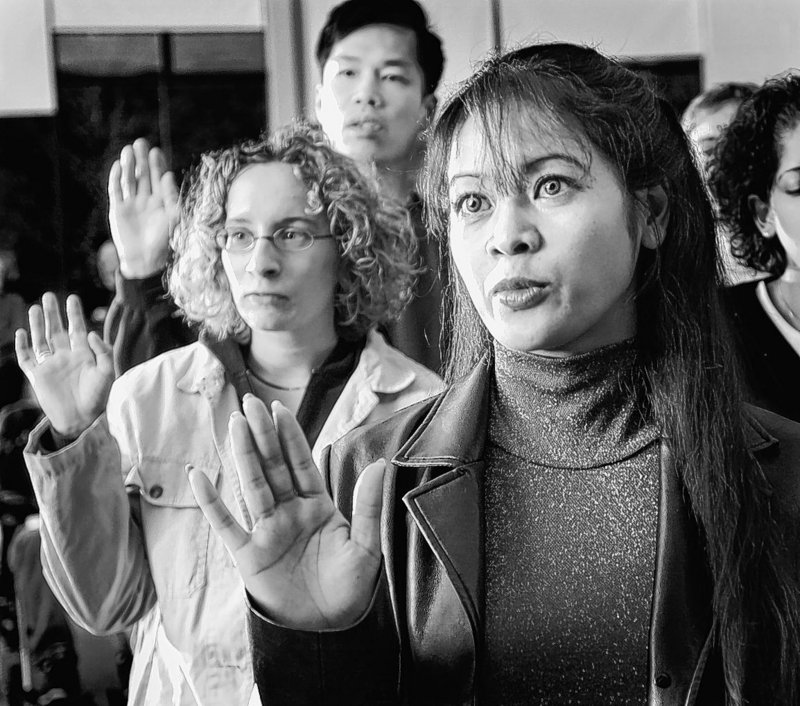I moved from Mongolia to Maine 15 years ago to study political science at the University of Maine at Farmington. It has been a long, adventurous journey.
During my year-long research and interviewing for the report, “Asians in the Maine Economy: Opportunities for Growth,” issued by Maine Center for Economic Policy, I was excited to meet many others who found their way to Maine after incredible journeys, complicated by warfare, political turmoil and romantic or family relations that often span multiple continents.
Like generations of immigrants before them, they came to the United States to pursue a better life and have worked hard to achieve it.
People I interviewed appreciate the opportunity they have and the kindness they receive from their new-found friends and communities, and they never take anything for granted.
To them, “the American dream” means self-improvement and self-reliance through education and hard work.
All of them have made and are making great contributions to Maine’s economy, contrary to some persistent stereotyping of immigrants coming to Maine to live off welfare benefits at the expense of Maine taxpayers.
FLEEING LAOS
Sovann Meas lost her husband and two children to disease and famine during Pol Pot’s reign of terror in Cambodia. With help from a Scarborough church, she came to Maine with her remaining six children and put all of them through college while working as a laundress at Maine Medical Center.
Pronsavanh Soutthivong, co-owner of Bangkok Restaurant in Ellsworth, came to America at 19 as a refugee from Laos. During the Communist takeover, her family were separated at first, then fled together to the countryside, and later spent two years in a refugee camp in Thailand. She and her husband have worked virtually nonstop in their restaurant for the last 20 years while raising three children.
For Yueying Bloomer, love brought her from the metropolis of Gaungzhou, China, to Aroostook County, Maine, to marry “the nicest man” she’d ever met in her life, who works for the National Weather Service in Caribou. For Shenna Bunnell, however, studying for an M.B.A. in America was her way to escape the family pressure to enter marriage and help her gain her financial independence.
Now an economics professor and director of the Maine Health Research Institute, she enjoys her freedom as a modern professional woman and loves the beauty of the lakes and mountains around her Wilton home, reminiscent of her childhood in India.
According to the U.S. Census, there are 13,571 Asians in Maine, about only 1 percent of the state’s population. But their contributions to Maine’s economy are significant. In 2007, Maine’s Asian-owned businesses had sales and receipts of $284 million and employed 2,543 people. According to the Selig Center for Economic Growth, the 2009 buying power of Asians in Maine totaled $307 million, an increase of 277 percent since 1990.
Against Maine’s aging population, Maine’s Asian community provides a relatively younger and better educated workforce. Many work in the fastest growing industries like IT, health care, and biotechnology. They also enhance Maine’s education system as both students and teachers. There are Asian professors in virtually every Maine university and college and there are an increasing number of Asian youths attending Maine’s high schools.
TEACHING AND LIVING HISTORY
Ngo Vinh Long, a professor of history for 25 years at the University of Maine, was the first Vietnamese ever to attend Harvard College. Born at the end of the Japanese occupation of Vietnam, he survived nine years of the French Indochina War. At 16 he worked on mapmaking for the U.S. military before the Vietnam War. He is a well-known Asian affairs scholar and activist who helped found many organizations, including Oxfam America and the Committee of Concerned Asian Scholars.
Many people I interviewed experienced an initial “culture shock” upon arriving in Maine but soon learned to appreciate Maine’s unique environment and quality of life. Despite a dynamic in- and outflow of immigrants for family or work related reasons, more and more refugees and immigrants have chosen to settle in Maine. Today, Asians live in every Maine county, work in every employment sector, and volunteer in many different organizations.
It is in Maine’s interest to send a positive and welcoming message to immigrants, who will help Maine’s shrinking workforce, increase its tax base and consequently its revenues. Asian immigrants see great potential in Maine’s future, and all Mainers should see the great potential Asian immigrants can offer Maine.
– Special to the Telegram
Send questions/comments to the editors.



Success. Please wait for the page to reload. If the page does not reload within 5 seconds, please refresh the page.
Enter your email and password to access comments.
Hi, to comment on stories you must . This profile is in addition to your subscription and website login.
Already have a commenting profile? .
Invalid username/password.
Please check your email to confirm and complete your registration.
Only subscribers are eligible to post comments. Please subscribe or login first for digital access. Here’s why.
Use the form below to reset your password. When you've submitted your account email, we will send an email with a reset code.